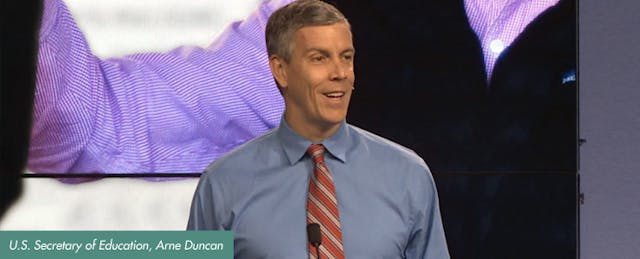Last Wednesday, an invite-only crowd of nearly a thousand of education’s daring entrepreneurs, policymakers, admins, teachers--and even a few students--gathered outside of San Francisco for the 2013 NewSchools Summit. And what a flurry of action it was, with bigwig thought leaders sharing Big Ideas on the big stage, panel discussions on teachers, parents, and the Common Core, and our around-the-clock interviews with edupreneurs from startups and schools. (Stay tuned for the videos!)
New York Times columnist Thomas Friedman kicked the morning off challenging the audience to “stay in beta [and] always see yourself as a work in progress.” He added, for example, that “we’re still at the ‘AltaVista’ stage of MOOCs...Google hasn’t even been invented.” At lunch, Secretary of Education Arne Duncan spoke candidly about the need for more diversity at all levels of discussion around education reform. “This room quite frankly doesn’t reflect our nation’s students and doesn’t reflect where our nation is going in terms of demographics shift” said Duncan, who was interviewed by Laurene Powell Jobs. (Check out the full video here.)
As a nod to the 15th anniversary of NewSchools Venture Fund, luminaries like John Seely Brown shared their vision for education in 2028. He offered a look through the lens of play, where rather than placing absolute value in knowing something, learning would feel more like solving a riddle, where failure and refinement are accepted as the natural process to discovery and answers. “We need to cultivate 21st century imaginations...If you don’t have imagination, creativity don’t matter,” he remarked, reminding us that even creativity is just a tool for making what the imaginative invent.
Others weren’t as optimistic. During the closing session, one audience member asked, “Why should I be excited to be a teacher in 2028?” A couple panel discussions attempted to address where teachers fit among all the excitement over technology-fueled reform. Common Core implementation remained a contentious issue as the question remained: who’s taking responsibility in providing teachers with the proper guidance and support? American Teacher Federation's Randi Weingarten reiterated her call for a year-long "moratorium" on the consequences of testing students on Common Core standards.
Yet there was hope for revitalizing the teaching profession. Diane Tavenner, founder and CEO of Summit Public Schools, challenged us to rethink the metrics for teacher retention with asking. “Do we need teachers to stay 30 years?” she asked. “I’m happy with four good years, especially if they move on to do something else productive, particularly in education reform.” Richard Nyankori, VP at Insight Education Group, agreed and called for the profession to offer more flexibility to allow for a new generation of teachers “to go in and out of teaching so they not only have classroom experience, but practical experience to help inform what they do in the classroom.”
The day wound up with John Doerr, one of Silicon Valley's most famous venture capitalists and the cofounder of NewSchools--chatting with Zynga founder, Mark Pincus.
Pincus credited Doerr with introducing the idea of "fast failure." He noted: "You're going to fail most of the time. Don't get attached to it."
Even so, he was upbeat--in a quiet sort of way.
"I'm off the Richter scale as an optimist," Pincus added. "Even with so much uncertainty, I have this faith based on pattern recognition that what's coming is more than we can imagine today."


